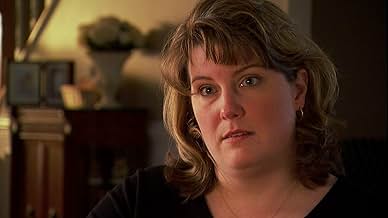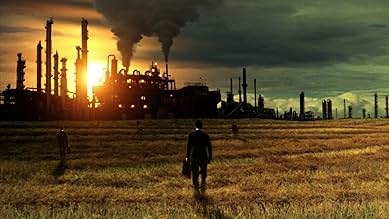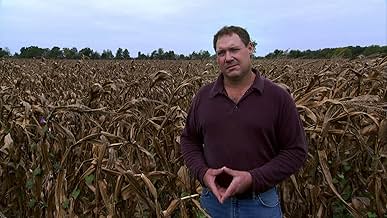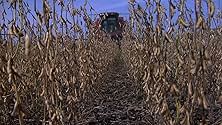AVALIAÇÃO DA IMDb
7,8/10
53 mil
SUA AVALIAÇÃO
Adicionar um enredo no seu idiomaAn unflattering look inside America's corporate controlled food industry.An unflattering look inside America's corporate controlled food industry.An unflattering look inside America's corporate controlled food industry.
- Direção
- Roteiristas
- Artistas
- Indicado a 1 Oscar
- 7 vitórias e 20 indicações no total
- Direção
- Roteiristas
- Elenco e equipe completos
- Produção, bilheteria e muito mais no IMDbPro
Avaliações em destaque
With family run farms pretty much a thing of the past, institutional farming has pretty much taken over,and the dim,dark & dismal effects are omnipresent. There is an epidemic of food borne illness,due to cattle being exposed to over use of steroids to make them grow fatter, faster (and this also includes chickens,pigs,etc.),not to mention GMO corn,grains,etc. Robert Kenner's eye opening film, 'Food,Inc.' manages to shine at least some light on some pretty unethical practices that are being undertaken by corporate owned & managed farms. The likes of Eric Schlosser (author of 'Fast Food Nation',which was made into a semi fictional film a few years back)is featured in interviews,along with Michael Pollan. Many fingers are pointed at guilty parties doing the dirty deeds of the farming industry,along with some pretty unpleasant footage of unethical practices (i.e. abuse of farm animals, although this film doesn't take up any kind of vegetarian/vegan agenda of it's own---the viewer can make up their own mind just what they prefer to eat). Much to my surprise,there is little discussion of the mad cow disease epidemic (or,BSE)from a few years back (only a passing reference). Rated PG by the MPAA,this film contains some unpleasant footage of animal abuse,as well as a rude word,or two. Okay for older children who care about what's on their plate for breakfast,lunch or dinner.
This documentary does a good job educating the consumers on how food is produced,packed and marketed in U.S nowadays. By going back repeatedly to how it was before it shows us how much it has evolved and also the effects of those drastic changes on food prices, American eating habits and ultimately on their health. The movie does all that without ever going over the top or becoming apocalyptic, which seems to be a trend for these type of movies nowadays,it does call out the greedy mega food corporation and the state officials for not arming the regulatory agencies better but the consumers are also at fault here for not informing themselves enough on the content of the products in order to choose what's best for their health not just for their wallet.
The message of 'Food, Inc.' is that most of what Americans now eat is produced by a handful of highly centralized mega-businesses,and that this situation is detrimental to health, environment, even our very humanity. The ugly facts of animal mistreatment, food contamination, and government collusion are covered up by a secretive industry that wouldn't talk to the filmmakers or let the interiors of their chicken farms, cattle ranches, slaughterhouses, and meatpacking plants be filmed.
Informed by the voices and outlook of bestseller authors Eric Schlosser ('Fast Food Nation') and Michael Pollen ('The Omnivore's Dilemma'), this new film is an exposé that offers some hope that things can be made better through grassroots efforts. True, Kenner points out, Monsanto, Smithfield, Perdue, et al. are rich and powerful. But so were the tobacco companies, and if Philip Morris and Reynolds could be fought successfully, so can the food industry. The fact that the vast Walmart is switching to organic foods because customers want them shows people vote effectively with their pocketbooks every time they buy a meal.
Other documentaries have covered this ground before. The 2008 French documentary 'The World According to Monsanto' (2008) focused on how that company, with government support, monopolizes seed planting, and Deborah Koons' 2004 'The Future of Food' went over similar ground. Jennifer Abbott and Mark Achbar's sweeping 2003 film 'The Corporation' (2003) touched on Monsanto's monopoly too. In more general terms, the ominous, narration-free German documentary 'Our Daily Bread' (Nikolaus Geyrhalter, 2003) delivered 'Food, Inc.'s' message about dehumanized factory-style food production with a European focus. Richard Linklater's 2006 'Fast Food Nation' grew out of Schlosser's book about how bad and disgusting American fast food is and how it undermines the health. These are all good films, and there are and will be lots more. As this new film mentions, exploitation and malpractice in the meat industry were exposed as far back as Upton Sinclair's 1906 muckraking book, 'The Jungle.'
'Food, Inc.' is a populist and practical film that speaks with the voices of farmers, advocates, and journalists, and focuses on food, what's wrong with it, and what we can do about it. Kenner offers lots of practical information and appeals to everyday people. The film goes back to the Fifties to show how the rise of fast food contributed to centralized, less diverse American food production. MacDonald's now much of the chicken, beef, potatoes, and many other foods produced in the country. The film explains that only a handful of companies control not only most of the beef, pork, chicken, and corn produced in the US but most other food products as well. Moreover not only is corn the major feed given to food animals, but a surprising amount of the tens of thousands of products sold at today's supermarket -- that packaged junk racked in the center of the store that Atkins and now Pollen have told us to avoid, are also derived from corn. Because of the way certain food products have government support, hamburgers are cheaper than fresh vegetables. Kenner focuses on a low-income Orozcos who both work and feel forced to rely on fast food meals because they fill them and their kids more economically than fresh produce bought at the market.
The new industry has developed chickens that grow bigger faster with more breast meat. They're kept in closed dark pens. The story is the same for all these poor mass produced critters, crammed together in great numbers, filled with antibiotics, deformed, suffering, ankle deep in their own excrement, brutally killed. The film has good footage of the big southern meat producer, Smithfield, showing how the new mega-food industry feeds off of exploited low-wage illegal immigrants who it treats as expendable, just like the animals.
An important spokesman in 'Food, Inc.' is an organic farmer (you could just say a stubbornly old-fashioned one) called Joel Salatin of Polyface Farm in Swoope, Virginia, who's also an author, though the movie doesn't mention his books. His cattle are grass-fed and watching them, we realize that's the way nature meant them to be. They roams free, living a healthy life, trimming back the grass while fertilizing it so it will grow back. Cattle weren't meant to live on corn, and doing so has led to infection. The industry solution to such problems is not to change back to earlier methods, but to add more chemicals. They're doing crazy things like adding bleach to hamburger filler to keep the burgers from being poison.
It's hard to keep a balance in such a documentary but Kenner tries. That Hispanic family is important. Slow food and organics have been a thing of the rich, as their dilemma illustrates. There could be more focus on everyday people and their difficult daily choices. The Walmart story is important too: Walmart customers are everyday people. It's easy enough for well heeled families to buy boutique produce at farmer's markets. Average Joes don't always have the time or the money for that. Also important is Barbara Kowalcyk, who works in Washington with her mother as an advocate for stricter laws. Her 2 1/2-year-old son Kevin died in 12 days from a virulent form of E. coli after eating a hamburger on vacation. She wants not sympathy but control of an indifferent industry. Carole Morison is another vivid voice: she is a southern chicken farmer who lost her contract with Perdue for refusing to switch to dark enclosed tunnel chicken coops, the latest in a series of enforced "improvements" that lead to more production at the cost of more cruelty. She also explains how the farmers in thrall to these big companies are kept in debt like indentured servants.
Armed with witty, clear graphics and ironically bright color, 'Food, Inc.' has a chance of gaining more converts to "slow," organic, local food and opponents to crooked food regulation and monopolistic industry. This seems one of the most balanced and humane treatments of the subject yet.
Informed by the voices and outlook of bestseller authors Eric Schlosser ('Fast Food Nation') and Michael Pollen ('The Omnivore's Dilemma'), this new film is an exposé that offers some hope that things can be made better through grassroots efforts. True, Kenner points out, Monsanto, Smithfield, Perdue, et al. are rich and powerful. But so were the tobacco companies, and if Philip Morris and Reynolds could be fought successfully, so can the food industry. The fact that the vast Walmart is switching to organic foods because customers want them shows people vote effectively with their pocketbooks every time they buy a meal.
Other documentaries have covered this ground before. The 2008 French documentary 'The World According to Monsanto' (2008) focused on how that company, with government support, monopolizes seed planting, and Deborah Koons' 2004 'The Future of Food' went over similar ground. Jennifer Abbott and Mark Achbar's sweeping 2003 film 'The Corporation' (2003) touched on Monsanto's monopoly too. In more general terms, the ominous, narration-free German documentary 'Our Daily Bread' (Nikolaus Geyrhalter, 2003) delivered 'Food, Inc.'s' message about dehumanized factory-style food production with a European focus. Richard Linklater's 2006 'Fast Food Nation' grew out of Schlosser's book about how bad and disgusting American fast food is and how it undermines the health. These are all good films, and there are and will be lots more. As this new film mentions, exploitation and malpractice in the meat industry were exposed as far back as Upton Sinclair's 1906 muckraking book, 'The Jungle.'
'Food, Inc.' is a populist and practical film that speaks with the voices of farmers, advocates, and journalists, and focuses on food, what's wrong with it, and what we can do about it. Kenner offers lots of practical information and appeals to everyday people. The film goes back to the Fifties to show how the rise of fast food contributed to centralized, less diverse American food production. MacDonald's now much of the chicken, beef, potatoes, and many other foods produced in the country. The film explains that only a handful of companies control not only most of the beef, pork, chicken, and corn produced in the US but most other food products as well. Moreover not only is corn the major feed given to food animals, but a surprising amount of the tens of thousands of products sold at today's supermarket -- that packaged junk racked in the center of the store that Atkins and now Pollen have told us to avoid, are also derived from corn. Because of the way certain food products have government support, hamburgers are cheaper than fresh vegetables. Kenner focuses on a low-income Orozcos who both work and feel forced to rely on fast food meals because they fill them and their kids more economically than fresh produce bought at the market.
The new industry has developed chickens that grow bigger faster with more breast meat. They're kept in closed dark pens. The story is the same for all these poor mass produced critters, crammed together in great numbers, filled with antibiotics, deformed, suffering, ankle deep in their own excrement, brutally killed. The film has good footage of the big southern meat producer, Smithfield, showing how the new mega-food industry feeds off of exploited low-wage illegal immigrants who it treats as expendable, just like the animals.
An important spokesman in 'Food, Inc.' is an organic farmer (you could just say a stubbornly old-fashioned one) called Joel Salatin of Polyface Farm in Swoope, Virginia, who's also an author, though the movie doesn't mention his books. His cattle are grass-fed and watching them, we realize that's the way nature meant them to be. They roams free, living a healthy life, trimming back the grass while fertilizing it so it will grow back. Cattle weren't meant to live on corn, and doing so has led to infection. The industry solution to such problems is not to change back to earlier methods, but to add more chemicals. They're doing crazy things like adding bleach to hamburger filler to keep the burgers from being poison.
It's hard to keep a balance in such a documentary but Kenner tries. That Hispanic family is important. Slow food and organics have been a thing of the rich, as their dilemma illustrates. There could be more focus on everyday people and their difficult daily choices. The Walmart story is important too: Walmart customers are everyday people. It's easy enough for well heeled families to buy boutique produce at farmer's markets. Average Joes don't always have the time or the money for that. Also important is Barbara Kowalcyk, who works in Washington with her mother as an advocate for stricter laws. Her 2 1/2-year-old son Kevin died in 12 days from a virulent form of E. coli after eating a hamburger on vacation. She wants not sympathy but control of an indifferent industry. Carole Morison is another vivid voice: she is a southern chicken farmer who lost her contract with Perdue for refusing to switch to dark enclosed tunnel chicken coops, the latest in a series of enforced "improvements" that lead to more production at the cost of more cruelty. She also explains how the farmers in thrall to these big companies are kept in debt like indentured servants.
Armed with witty, clear graphics and ironically bright color, 'Food, Inc.' has a chance of gaining more converts to "slow," organic, local food and opponents to crooked food regulation and monopolistic industry. This seems one of the most balanced and humane treatments of the subject yet.
Greetings again from the darkness. Was reticent to see this one thinking I might never want to eat again. Much of what is in the film is not really new, but the entire segment on corn was really an eye opener.
No real surprise that a few giant companies, with governmental subsidies, control our entire food market ... and that it run like a giant factory and not Grandpa's farm. Still it is painful to watch what the workers and animals and farmers are subjected to.
The two messages we are left with - push the government for better controls and power by the FDA and USDA, and eat more organic food ... even if it is more expensive.
No real surprise that a few giant companies, with governmental subsidies, control our entire food market ... and that it run like a giant factory and not Grandpa's farm. Still it is painful to watch what the workers and animals and farmers are subjected to.
The two messages we are left with - push the government for better controls and power by the FDA and USDA, and eat more organic food ... even if it is more expensive.
"Faster, fatter, bigger, cheaper." A farmer describes fast food folly.
Although I would like to call Food, Inc. a horror film, I must relax my delicate eating sensibilities to call it a disturbing documentary. Images of little chickens hanging like laundry on conveyor cables above fast-moving assembly lines and cows patiently standing knee high in feces have changed my attitude toward grilling.
Robert Kenner's Food, Inc. isn't half the fun of a Michael Moore doc in which the infamous director savages everyone from auto execs to neocons. Kenner is more credible because he doesn't viciously pursue any one official, just the food industry itself (and McDonald's more than any other), which has become oligarchic and impersonal, endangering the quality and safety of consumers. Unlike Moore, Kenner has no sense of humor.
Like almost all documentarians, Kenner smartly offers ways to change the barbaric methods and marketing of food. In truth too little praise is given to the food giants that have provided good nutrition and cheaper food in an amazing harvesting that can feed the world. Narrator/interviewer Eric Schlosser (Fast Food Nation) and scientist Michael Pollan (UC Berkeley) modestly present their cases for food abuse such as the demand in corporations like McDonalds for "faster, fatter, bigger, cheaper."
On the point of treating animals with kindness, the documentary has encouraged me to consider vegetables.
Although I would like to call Food, Inc. a horror film, I must relax my delicate eating sensibilities to call it a disturbing documentary. Images of little chickens hanging like laundry on conveyor cables above fast-moving assembly lines and cows patiently standing knee high in feces have changed my attitude toward grilling.
Robert Kenner's Food, Inc. isn't half the fun of a Michael Moore doc in which the infamous director savages everyone from auto execs to neocons. Kenner is more credible because he doesn't viciously pursue any one official, just the food industry itself (and McDonald's more than any other), which has become oligarchic and impersonal, endangering the quality and safety of consumers. Unlike Moore, Kenner has no sense of humor.
Like almost all documentarians, Kenner smartly offers ways to change the barbaric methods and marketing of food. In truth too little praise is given to the food giants that have provided good nutrition and cheaper food in an amazing harvesting that can feed the world. Narrator/interviewer Eric Schlosser (Fast Food Nation) and scientist Michael Pollan (UC Berkeley) modestly present their cases for food abuse such as the demand in corporations like McDonalds for "faster, fatter, bigger, cheaper."
On the point of treating animals with kindness, the documentary has encouraged me to consider vegetables.
Você sabia?
- CuriosidadesOn the Region 1 DVD packaging, the UPC bar-code on the cow is different from the one shown on the theatrical poster. The bar-code on the poster is 4-73762-52481-6-(18). The bar-code on the Region 1 DVD packaging is 8-76964-00216-5 : the same bar-code that appears on the back cover of the DVD. As of 2022, the bar-code used on the poster is not an active code.
- Citações
Michael Pollan: There are no seasons in the American supermarket. Now there are tomatoes all year round, grown halfway around the world, picked when it was green, and ripened with ethylene gas. Although it looks like a tomato, it's kind of a notional tomato. I mean, it's the idea of a tomato.
- ConexõesFeatured in Durch die Nacht mit...: Tim Raue und Dave Arnold (2009)
- Trilhas sonorasSunny L.A.
Written by Nancy Peterson
Performed by Great American Swing Band
Principais escolhas
Faça login para avaliar e ver a lista de recomendações personalizadas
- How long is Food, Inc.?Fornecido pela Alexa
Detalhes
- Data de lançamento
- País de origem
- Central de atendimento oficial
- Idioma
- Também conhecido como
- Food, Inc.
- Locações de filme
- Empresas de produção
- Consulte mais créditos da empresa na IMDbPro
Bilheteria
- Faturamento bruto nos EUA e Canadá
- US$ 4.417.674
- Fim de semana de estreia nos EUA e Canadá
- US$ 60.513
- 14 de jun. de 2009
- Faturamento bruto mundial
- US$ 4.606.199
- Tempo de duração1 hora 34 minutos
- Cor
- Mixagem de som
- Proporção
- 1.78 : 1
Contribua para esta página
Sugerir uma alteração ou adicionar conteúdo ausente
























